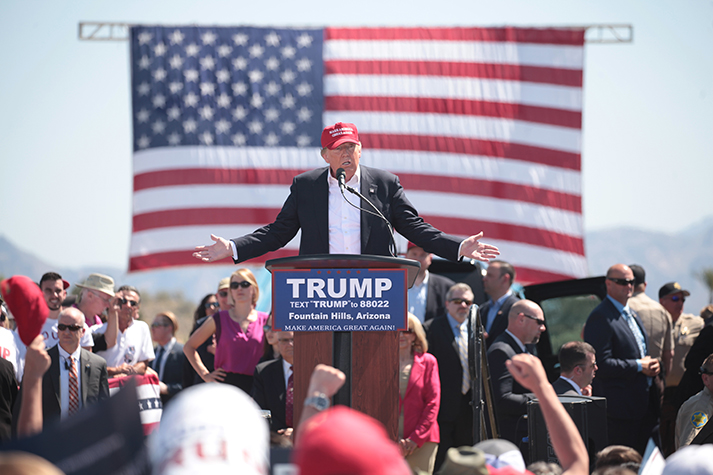Republican Party candidate Donald Trump has won the 2016 presidential election against rival Democratic Party candidate Hillary Clinton, according to the Associated Press.
In a stunning rebuke of the U.S. political establishment, Trump is expected to win at least 290 electoral votes compared to Clinton’s 228 electoral votes, as of press time.
Trump’s victory was sealed by wins in Pennsylvania, Ohio and Wisconsin, states which have gone for Democrats in recent elections and have been disproportionately affected by job losses as a result of globalization — a theme that the Republican candidate made a centerpiece of his campaign.
As of press time, Clinton is leading in the popular vote total over Trump with 47.7 percent compared to his 47.5 percent, with 98 percent of the nation’s precincts reporting.
Trump attempted to unify the American people in his acceptance speech on Wednesday morning.
“I pledge to every citizen of our land that I will be President for all of Americans, and this is so important to me,” President-elect Trump said. “For those who have chosen not to support me in the past, of which there were a few people, I’m reaching out to you for your guidance and your help so that we can work together and unify our great country.”
Clinton conceded the race in a speech later in the day, saying that “we owe (Trump) an open mind and a chance to lead.”
(Story continues below)
How Donald Trump reshaped the election map https://t.co/ukCDucv7jg pic.twitter.com/y6v5d1PmuB
— The New York Times (@nytimes) November 9, 2016
Why did Clinton fail?
Clinton was dogged by allegations of personal corruption throughout the campaign, with Democrats and Republicans alike questioning her personal ethics relating to paid speeches she gave to Wall Street banks and the fact that she kept a private email server while she was Secretary of State against State Department procedures.
But Trump’s electoral college victories would have been impossible had he not made major in-roads among a group that for much of the last century sat at the heart of the Democratic Party’s coalition: working-class whites.
According to New York Times exit polls, Clinton lost whites without a college degree by 39 percentage points. Obama lost that cohort four years ago by 31 points, according to The Atlantic.
That may have made all the difference in states like Pennsylvania and Ohio, which have had a slower recovery from the Great Recession than most of the rest of the country, and where Trump’s anti-globalization message ran strong in what was once the world’s center of manufacturing.
Clinton’s husband, former President Bill Clinton, signed the North American Free Trade Agreement (NAFTA) in 1994. NAFTA was criticized by both Trump and Hillary Clinton’s Democratic primary opponent, Bernie Sanders.
According to the Economic Policy Institute, NAFTA has led to a net loss of 682,900 U.S. jobs and increased thirtyfold the U.S. trade deficit with Mexico.
As Politico reported in September, registered Democrats in Pennsylvania felt threatened by Clinton’s pro-trade, anti-coal policies.
“The short of it is that I am looking at this election through self-preservation,” Democrat Angela LeJohn of Charleroi, Pennsylvania told Politico. She added that she was planning to vote for Trump because he and Republican Senate candidate Pat Toomey “have my back.”
Trump outperformed Clinton among independents, 48-42, and earned a higher portion of Democratic votes than Clinton did of Republican votes, 9-7.
Brexit, Part II?
Trump’s unlikely rise from New York businessman to President-elect of the United States appears to be part of a larger backlash against globalization and demographic change happening across the West.
Commentators have compared Trump’s victory to the United Kingdom’s vote to leave the European Union in June, which the majority of polls expected to fail.
Nigel Farage, the former leader of the U.K. Independence Party and a major backer of June’s Brexit, drew a connection in a Facebook post following Trump’s win.
“What we are witnessing is the end of a period of big business and big politics controlling our lives,” Farage wrote. “Voters across the Western world want nation state democracy, proper border controls and to be in charge of their own lives.”
Both the Brexit and Trump campaigns employed rhetoric criticizing not only globalization but also immigrants and refugees, particularly from the Muslim world.
Similar fears are at the back of Marine Le Pen, the leader of France’s National Front party. The Syrian refugee crisis breathed new life into the right-wing, anti-European Union and economically protectionist party that is expected to win the first round of voting in France’s April elections.
“Today the United States,” Le Pen’s father — the founder of the National Front — tweeted. “Tomorrow France.”
Why were the polls wrong?
According to pollster Arie Kapteyn — whose Los Angeles Times/USC poll proved among the most accurate in the weeks taken before the election — Trump voters may have been embarrassed about revealing their presidential selection to pollsters over the phone, fearing negative consequences if they did so.
“There’s some suggestion that Clinton supporters are more likely to say they’re a Clinton supporter than Trump supporters are to say they’re a Trump supporter,” Kapteyn told the USA Today early Wednesday.
The Los Angeles Times/USC poll showed a three point lead for Trump going into election day. It was conducted online, rather than by telephone.
Exit polls taken Tuesday show a marked disconnect with the predictions of commentators in recent weeks who expected a Clinton victory among white women and whites with a college education, something that Democrats have not pulled off in generations.
White women in general broke for Trump 53-43, according to an NBC News exit poll. Whites with a college education also broke for Trump 49-45.
































































































































